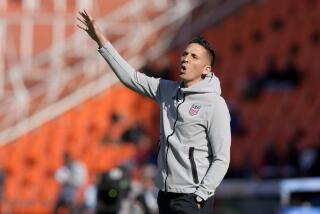Mood Swing Key for U.S.
- Share via
SEOUL — Soon, the debacle of 1998 will no longer matter. Three weeks from now, the United States team’s woeful performance in the France ’98 World Cup will have ceased to be an issue.
Instead, fans might well be talking about the debacle of 2002.
Four years have passed, new players have emerged, a new coach has revitalized the team and more than a few results have gone the Americans’ way, but all that does not mean that the U.S. will do any better this time around.
Portugal, South Korea and Poland could turn out to be just as difficult a series of opponents as Germany, Iran and Yugoslavia were in 1998, when the U.S. team lost all three of its first-round games, the players got into an ugly brouhaha with then-coach Steve Sampson and American soccer was left with a black eye.
Finishing 32nd in a 32-team tournament does not cut it on the U.S. sporting landscape. The television cameras vanish and the losers are left to slink off into the bushes and lick their wounds in anonymity.
For the moment, however, such thoughts are far from the minds of Coach Bruce Arena and his players. All is sweetness and light in the U.S. camp, where the mood is upbeat and confidence is high.
The scars have healed. Even though 10 of Arena’s 23 players are holdovers from 1998, time has worn away the rough edges of that unpleasant experience, when a 2-0 loss, a 2-1 loss and a 1-0 loss sent the team home in a hurry.
“It’s a much different attitude now,” said striker Brian McBride, whose goal against Iran was the only one the U.S. scored in France.
“I think people bring up 1998 way too much.... There just wasn’t complete harmony.... I don’t think the players had the right attitude, or the coaches.”
McBride acknowledges that the results in 2002 might not be much different, but accepts that as the way things are.
“If we play our best soccer and don’t get positive results, we have to be happy with that,” he said. “It’s not our goal, but soccer is a weird game. Sometimes you have a great game, you play well as a team, and you don’t win. You just have to be focused on the right things.”
One area of focus for Arena has been the relationships among the players, making sure the mix is right and that there are no malcontents lingering in the corners.
“I think team chemistry is quite a bit better [than in 1998],” defender Eddie Pope said before the team left for South Korea. “There are quite a few more smiling faces walking around right now.”
Here, however, many of the smiling faces are Portuguese. Portugal is an overwhelming favorite to win the opener against the U.S. in Suwon a week from today. After that, South Korea will have 62,000 of its own fans on hand in Daegu to give it a boost in the Americans’ second game on June 10. Closing the first round against physically strong Poland, which might only need a tie at that point, is not going to be any picnic either on June 14 in Daejeon.
Right now, though, the Americans are concentrating on Portugal and how to stop its impressive list of highly paid players.
Defender Jeff Agoos believes teamwork will make up for any deficiencies in star quality.
“When you compare us to teams like Portugal, we may not match up against them individually,” he said. “But we can be a better team than the teams we are playing against, and that’s what can make the difference for us.”
Arena has drummed that point home for four years.
When asked in a recent on-line interview about what happened in France, he said only those who were there and took part will ever know the full story but that “obviously, there were things that went wrong.”
As Arena pointed out, however, it wasn’t the end of the road. Failure in France didn’t undo all the work that had preceded that World Cup, just as the U.S. performance in Korea/Japan ’02 will not undo the work of the last four years.
“We didn’t fall off the face of the Earth,” Arena said. “That’s why we’re still around.... I think it would be tremendous if we could move forward into the second round. If we don’t, and we still show well and show improvement, it’ll be positive for the sport in this country.”
He meant the U.S., not South Korea.







